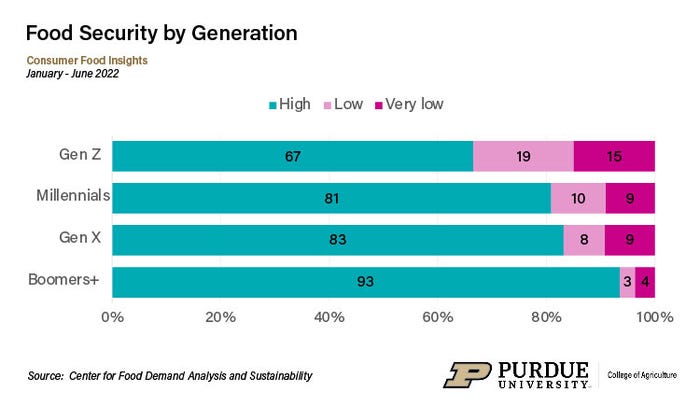Gen Z households struggle more to put food on the table
Since January, 30% of Gen Z adults have experienced or are experiencing food insecurity, compared to 19% of Millennial and Gen X adults, 7% of Boomers.
July 14, 2022

Gen Z households are struggling more to put food on the table compared to those of Millennials, Gen X and Boomers, according to the Consumer Food Insights Report.
Thirty percent of Gen Z households report seeking groceries from a food pantry, church or other charity in the last 30 days, compared to 8% of Boomer households, it showed.
The survey-based report out of Purdue University's Center for Food Demand Analysis and Sustainability assesses food security and spending, consumer satisfaction and values, support of agricultural and food policies and trust in information sources.
In addition to the monthly survey, the team analyzed how responses differed between respondents of different age groups. The team studied survey data from January to June of 2022 and divided respondents into the age groups of Gen Z (those born after 1996), Millennials (those born from 1981-1996), Gen X (those born from 1965-1980) and Boomers+ (those born before 1965). The results showed differences in food security, beliefs about their food and food system, shopping habits, policy support and in what information sources they trust.
"Since January, around 30% of Gen Z adults have experienced or are experiencing food insecurity, compared to around 19% of Millennial and Gen X adults and 7% of Boomers," says Jayson Lusk, the head and distinguished professor of agricultural economics at Purdue, who leads the center. "Those who are younger tend to have lower incomes, so the results aren't necessarily surprising, but we need to pay attention to it. Food inflation is outpacing salary growth, and it hits those with the lowest incomes the hardest."

Purdue experts conducted and evaluated the survey, which included 1,200 consumers across the United States.
Additional key results include:
16% of all households are food insecure.
Most consumers are worried about the impacts of the war in Ukraine on food supplies.
Food demand and happiness continue to be price insensitive.
Trust in the FDA dropped more than 20% from last month.
A Sustainable Food Purchasing Index of 70/100.
The survey results show consumers clearly follow current events, Lusk says. Seventy percent of respondents are worried about the Russia-Ukraine war affecting global food supplies, and 58% said the war had impacted the price or availability of their food.
The continuing drop in trust of the Food and Drug Administration also correlates with its recent involvement in controversies, he says.
It is interesting that the rapid rise of food prices does not seem to have yet changed how Americans think or feel about their food, as food satisfaction measures remain strong, says Sam Polzin, a food and agriculture survey scientist for the center and co-author of the report.
"Official government estimates show food prices, like gas prices, dramatically rising over the past year, though not quite as sharply as gas," Polzin says. "However, consumers report being extremely dissatisfied with gas affordability but feeling neither satisfied nor dissatisfied with food affordability. Perhaps this says more about the unique power gas prices have on the American psyche."
The Sustainable Food Purchasing Index offers insight into how sustainability and health relate to consumer behaviors. It is a self-reported assessment of how consumer shopping habits correspond with healthy diets from sustainable food systems. The June score was the highest of the survey to date but remains broadly consistent, Polzin says. Millennials scored the highest on the environment, social and nutrition indicators, while consumers in the Boomers+ group scored higher on the taste, economic and security indicators.
Source: Purdue University, which is solely responsible for the information provided, and wholly owns the information. Informa Business Media and all its subsidiaries are not responsible for any of the content contained in this information asset.
You May Also Like



